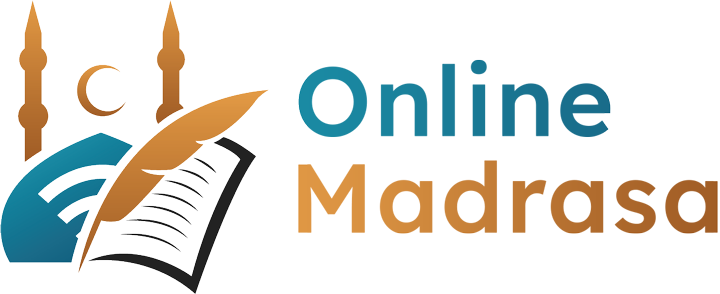Blog
Duas of Ramadan and Rules of Fasting

Dua and Rules of Fasting During Ramadan
Will you keep fasting in the coming Ramadan 2024? Here is the complete guide to understanding the month of Ramadan, its holiness, rules of fasting, dua for starting the fast, dua for closing the fast, and other essential duas in Ramadan. Apart from these, you should also learn who is obliged to keep fasting and who is exempted from fasting.
Fasting or Sawm means to stop, to stop from eating, drinking, and having sexual relations with spouses. It is the 4th pillar of Islam among the other five pillars. In the month of Ramadan, Muslims around the world keep fasting.
Rules of Fasting During Ramadan
Islam has defined obvious rules of fasting. However, you should know that Muslims also keep fasting in other months, but fasting during Ramadan is obligatory. However, the rules for keeping fast, breaking fast, and invalidating fast are the same for fasting in other months. Similarly, Islam has guided us on who is obliged to keep fasting and who is exempted. Here are complete details of who is obliged to keep fasting.
Importance of Ramadan
Ramadan is the month of Blessings and the ultimate time for Muslims to gain uncountable rewards. It is obligatory for all Muslims to observe fasts during Ramadan. It is stated in the Quran:
Translation: “O you who believe, fasting is prescribed for you as prescribed for those before you so that you may achieve Taqwaa (righteousness, God-fearing).” [Surat Al-Baqarah, verse 183]
The reward for observing fast is mentioned by Prophet Muhammad (PBUH) as follows:
“Whoever observes the fast during the month of Ramadan, (while) believing in Allah and seeking His rewards, will have his past sins forgiven.” [Reported by Imaams Bukhaari, Muslim, and others]
So, knowing about the virtue and importance of Ramadan fasts, let’s discuss the basic rules of fasting that all Muslim scholars agree upon.
When to Start Fasting? [The Age Limit]
Islamic rules for fasting call for every Muslim who is safe and healthy to start fasting about the time they reach puberty, which is defined differently based on culture and adherence and can range from age 7 to the late teens. Many American Muslims start partial or complete fasting at about age 10.
The Vital Element of Fasting in Ramadan
Your Intention: It is essential to make the intention of Ramadan fast before dawn. You can make the intention in your heart that you must complete your fast for the sake of Allah. Similarly, depending on your location, you have to break the fast when you listen to Maghrib’s call.
The supplication/ duas to make intention for observing and break the fast in Ramadan are as follows:
Dua’s of Ramadan `{`Fast | Aftar`}`
List of Duas in Ramadan
Here is the list of Duas and translations you should say during Ramadan.
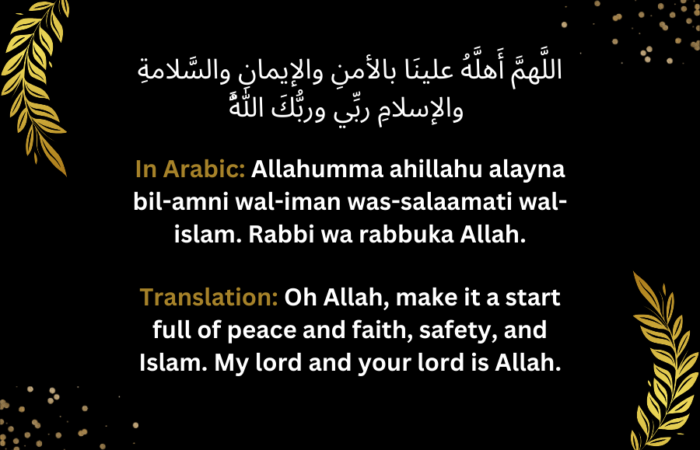
1. When you see the Crescent Moon
اللَّهمَّ أَهلَّهُ علينَا بالأمنِ والإيمانِ والسَّلامةِ والإسلامِ ربِّي وربُّكَ اللَّهُ
[Tirmidhi]
In Arabic: Allahumma ahillahu alayna bil-amni wal-iman was-salaamati wal-islam. Rabbi wa rabbuka Allah.
Translation in English: Oh Allah, make it a start full of peace and faith, safety, and Islam. My lord and your lord is Allah.
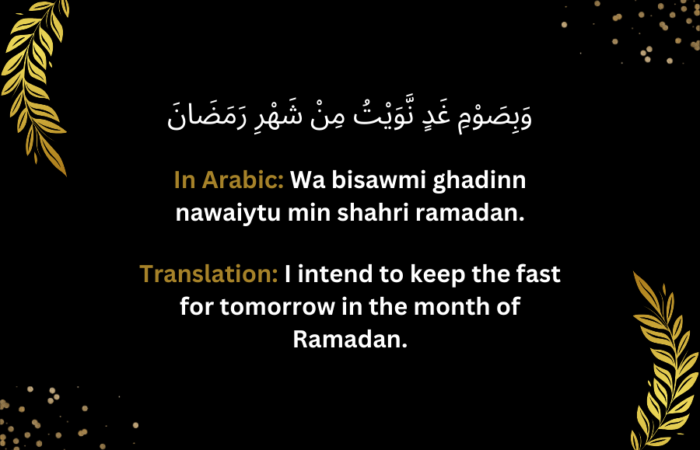
2. Dua for closing fast
وَبِصَوْمِ غَدٍ نَّوَيْتُ مِنْ شَهْرِ رَمَضَانَ
[Abu Dawud]
In Arabic: Wa bisawmi ghadinn nawaiytu min shahri ramadan.
In English: I intend to keep the fast for tomorrow in the month of Ramadan.
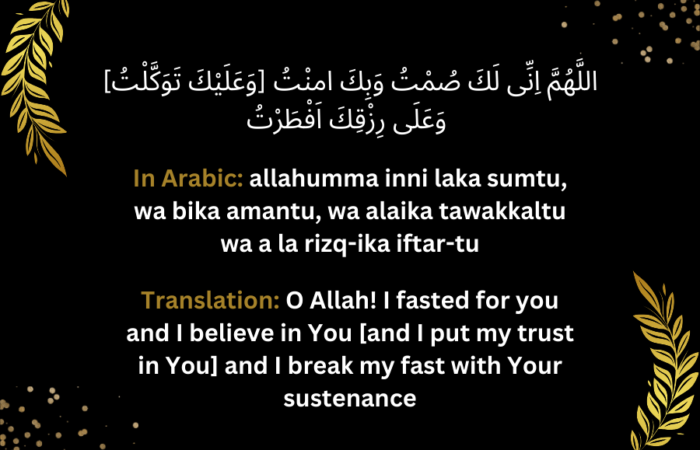
3. Dua for breaking fast
اللَّهُمَّ اِنِّى لَكَ صُمْتُ وَبِكَ امنْتُ [وَعَلَيْكَ تَوَكَّلْتُ] وَعَلَى رِزْقِكَ اَفْطَرْتُ
[Abu Dawud]
In Arabic: allahumma inni laka sumtu, wa bika amantu, wa alaika tawakkaltu wa a la rizq-ika iftar-tu
In English: O Allah! I fasted for you, and I believe in You [and I put my trust in You], and I break my fast with Your sustenance
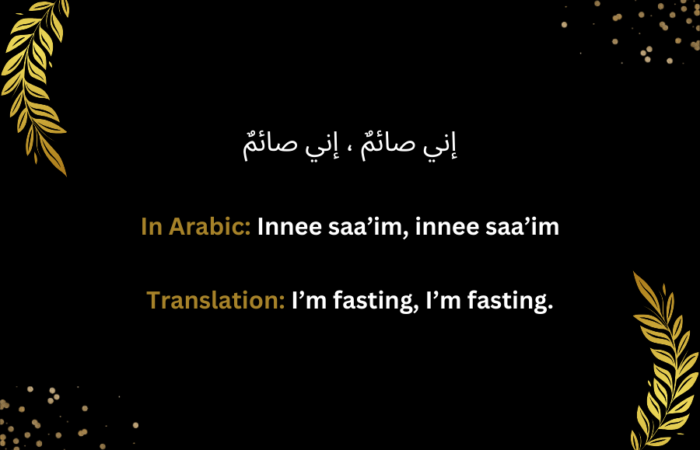
4. Dua, when anger while, fasting
إني صائمٌ ، إني صائمٌ
[Muslim]
In Arabic: Innee saa’im, innee saa’im
In English: I’m fasting, I’m fasting.
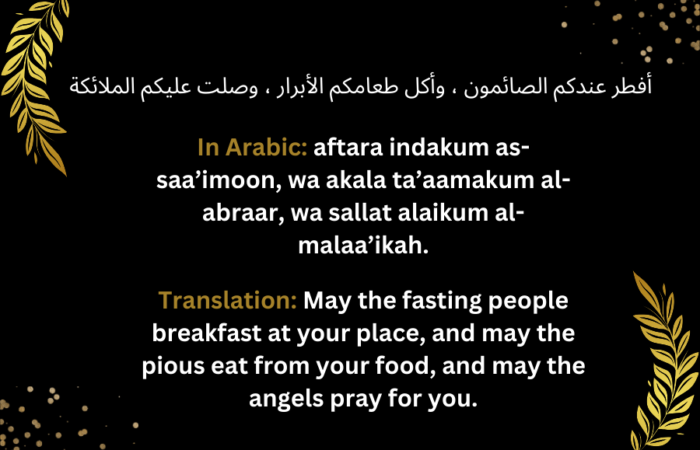
5. Dua for breaking fast with a group of people
أفطر عندكم الصائمون ، وأكل طعامكم الأبرار ، وصلت عليكم الملائكة
[Ibn Majah]
In Arabic: aftara indakum as-saa’imoon, wa akala ta’aamakum al-abraar, wa sallat alaikum al-malaa’ikah.
In English: May the fasting people breakfast at your place, and may the pious eat from your food, and may the angels pray for you.
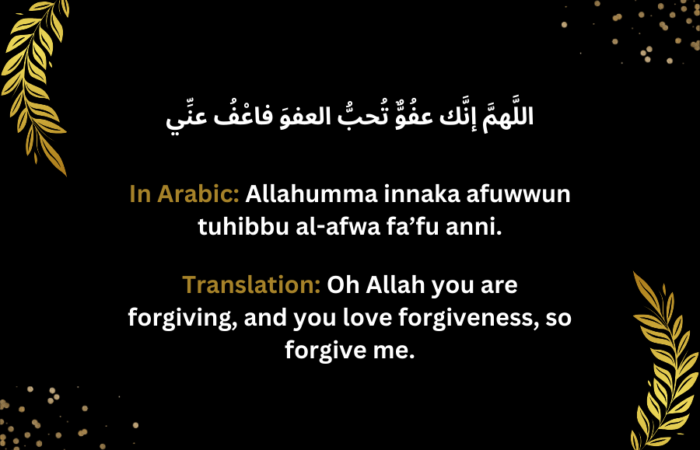
6. Dua for Laylatul Qadr
اللَّهمَّ إنَّك عفُوٌّ تُحبُّ العفوَ فاعْفُ عنِّي
[Tirmidhi]
In Arabic: Allahumma innaka afuwwun tuhibbu al-afwa fa’fu anni.
In English: Oh Allah, you are forgiving, and you love forgiveness, so forgive me.
Rules of Fasting
Who is obliged to fast in the Month of Ramadan?
1. The Age Limit for Adults – For Fasting
In Ramadan, every adult Muslim, man and woman, is obliged to keep fasting from dawn to sunset. Fasting was made obligatory in the second year of Hijrat.
Muslims must start fasting from the first day of the holy month of Ramadan, which begins with the crescent sighting, till the first night of Shawal, the 10th month in the Islamic calendar. Moreover, both the start of the month of Ramazan and the end of the month of Ramadan depend on sighting the crescents.
Actions that Negate your Fast
There are a few actions agreed upon by all scholars that can potentially nullify your fast. They are important rules of fasting during Ramadan. Here they are;
- Eating or Drinking Intentionally
- Vomiting intentionally
- Intercourse with Spouse
- Menstrual/Childbirth Bleeding
Eating or Drinking Intentionally:
If you intentionally choose to drink or eat anything for any reason, then your fast will be invalid. But if done unintentionally or by mistake, then you should continue your fast because it’s still valid.
Vomiting intentionally:
But if you overcome the impulse to vomit and it just happens unintentionally, then you can continue your fast. If someone chooses to vomit for any reason then the fast becomes invalid.
Intercourse with Spouse
If someone has sexual intercourse with the spouse, then he has to pay Kaffarah(compensation for the sin). He has to fast for 60 days or if unable to do so, feed 60 poor people.
Menstrual/Childbirth Bleeding
The fast becomes invalid if the menstrual or post-childbirth bleeding starts. Even if it just begins before sunset, the fast of that day is nullified, and the day must be made up at a later time.
This is what Ramadan rules fasting all about.
Now, let’s see who is exempt from fasting in Ramadan.
Who is Exempt?
Because Ramadan is one of the basic five pillars of Islam, fasting in the month of Ramadan is compulsory for all healthy and adult Muslims. Only a few who secure Ramadan fasting exemption are as follows:
- Children who have not reached puberty yet.
The Older ones are physically or mentally not capable of fasting.
Pregnant women, breastfeeding mothers, and travelers are also exempt from fasting during Ramadan
The Rule of Fidyah or to Compensate your Fast Later:
Fidyah (Arabic: الفدية) is defined as a religious donation made in Islam when a fast during Ramadan is missed or broken before sunset. The donations can be in terms of food or money, and they are used to feed needy people.
Now let’s see who has to pay Fidyah:
A traveler traveling during Ramadan can miss the fast, and he has to make up the fast later.
The person who cannot fast due to a permanent illness or old age has to pay fidiyah (feeding one poor person) for each day of the Ramadan fast he has missed. If there are chances to recover from illness, then the person has to make up the missed fasts later.
Pregnant or nursing women who miss the Ramadan fasts due to fear of themselves or their child being weakened. They have the option to either give Fidyah for each day they miss the fast in Ramadan or to keep their missed fasts later.
The Permissible Actions during Ramadan
These are the acts that are mostly questioned by people, whether they are permissible or not. So, the following are the things that will NOT nullify the fat in Ramadan.
- Rinsing mouth and nose with water, but not with the intention of swallowing it.
- Taking shower
- Taking medical injections in case of illness or to prevent illness
- Taking Suppositories for any medical condition
- Breathing in different, light or intensive, natural or artificial scents
- Applying eye drops to avoid irritation or any other eye illness
- Drawing blood is also permissible, but if it weakens the person, then it is disliked
- Accidental consumption of food
- Embracing or kissing your spouse while fasting is also permissible if you are able to control yourself to modesty
- Being in the state of Janabah, if the dawn reaches, it is permissible to keep fast and take Ghusl(shower)before fajr prayer.
The Recommended Action in Ramadan
When talking about the rule of fasting in Ramadan, it is important to mention a few acts that are RECOMMENDED during Ramadan. These actions bring great rewards when done with pure intention just for the sake of Allah.
- Having a Suhoor Meal and even delaying it just before dawn time
- Hurry up in breaking your time when you listen to the Maghrib prayer
- Recite and understand the Quran
- Taraweeh Prayer
Hopefully, you now know what the rules of fasting in Ramadan are, what is permissible, what is not permissible, and what is recommended. Who has to keep the fat, and who has the exemption? May Allah (SWT) let us reach Ramadan 2021 successfully and keep our all fasts in peace.
Frequently Asked Questions (FAQs)
Who is obliged to fast in the Month of Ramadan?
In Ramadan, every adult Muslim, man and woman, is obliged to keep fasting from dawn to sunset. Fasting was made obligatory in the second year of Hijrat.
Muslims must start fasting from the first day of the holy month of Ramadan, which begins with the crescent sighting, till the first night of Shawal, the 10th month in the Islamic calendar. Moreover, both the start of the month of Ramazan and the end of the month of Ramadan depend on sighting the crescents.
Who is Exempt from fasting?
Fasting in the month of Ramadan is not obligatory for every Muslim. However, Islam gives relief in some cases, i.e., to children, women in illness, passengers, and old age people who are not able to keep fasting. After Ramadan, those who cannot observe fasting must give Fidyah. However, women or men who cannot keep fasting due to illness during Ramadan must keep fasting in other months to complete the missed days. Similarly, passengers should recover for those missed days in Ramadan after reaching their destination. Here are the details of Muslims who are exempt from fasting.
- Women in the phase of menses or post-childbirth bleeding
- Old age people
- Patients suffering from long-term illness
- Passengers travel for a valid purpose away from their city or residence, about 80 km.
What is Fidyah of Fasting?
Islam has set a specific ratio for paying Fidyah. However, in some cases, it is better to fast, but if someone cannot do so, then the Fidyah is given. The amount of Fidyah for missing one fast is to feed 1 needy person 2 times a day. In that ratio, the Fidaya for a complete month of Ramadan is feeding 30 needy persons 2 times a day or providing 60 persons 1 time a day. However, one can also pay the amount to needy persons equal to the cost of feeding them. The better option to recover the missing fast is to keep fasting. But, if someone cannot fast due to long-term illness or old age, then giving Fidyah is compulsory. Beware! Fidayah is for those who are unable to fast. If someone breaks fast intentionally before Iftari time, he or she will have to pay Kafarah.
What is Kaffarah of Fasting?
Fasting rules in the holy month of Ramadan are clear and understandable. Similarly, Islam also has defined strict rules for those who break fasting intentionally without any valid reason before Iftari time, and Islam strictly forbids the act. The person who does so will have to fast for 2 months continuously as Kaffarah. However, if the person cannot fast, he or she must feed 60 poor people or pay the amount equal to feeding 60 people for breaking a fast. Moreover, here are the details about things that break or invalidate fasting.
What are the Things that invalidate fasting?
You must avoid these things during fasting. Acting these will lead to invalidating your fasting. Then, you must pay Fidyah or Kaffarah according to the abovementioned ratio.
- Drinking, eating, and smoking intentionally.
- Vomiting deliberately
- The beginning of the menses period or post-childbirth bleeding.
- Sexual intercourse.
However, the above actions are forbidden only during fasting, i.e., from dawn to sunset.
What are the things that do not invalidate Fasting?
Rules of fasting in Ramadan are straightforward. It gives ease in many cases. Some actions are allowed during fasting. Doing these things will not lead to invalidating fasting.
- If water is unintentionally swallowed during a bath or shower, it will not invalidate fasting, according to most of the jurists of Islam. Moreover, swimming is also allowed during fast, but be careful of diving.
- Using eye drops or contact lenses
- Blood test or injection
- Using Perfume
- Using Miswak
- Rinsing mouth and nostrils
- Eating, drinking, and smoking unintentionally.
- (Like if you forget that you are fasting and you eat, drink, or smoke. You should instantly stop it when you come to know).
- Romance with wife or husband. But, you should avoid doing so as it may lead to anything further forbidden during fasting.
- Sleeping during the daytime and having a wet dream will not lead to invalidating the fasting.
What are the things that do not invalidate Fasting?
Rules of fasting in Ramadan are straightforward. It gives ease in many cases. Some actions are allowed during fasting. Doing these things will not lead to invalidating fasting.
- If water is unintentionally swallowed during a bath or shower, it will not invalidate fasting, according to most of the jurists of Islam. Moreover, swimming is also allowed during fast, but be careful of diving.
- Using eye drops or contact lenses
- Blood test or injection
- Using Perfume
- Using Miswak
- Rinsing mouth and nostrils
- Eating, drinking, and smoking unintentionally.
- (Like if you forget that you are fasting and you eat, drink, or smoke. You should instantly stop it when you come to know).
- Romance with wife or husband. But, you should avoid doing so as it may lead to anything further forbidden during fasting.
- Sleeping during the daytime and having a wet dream will not lead to invalidating the fasting.
Sunnahs of Hazrat Muhammad SAW during fasting
During Ramadan, we should also follow the Sunnah of our Prophet Muhammad SAW.
Sehri, also called a pre-dawn meal.
It is Sunnah to eat or drink something at dawn, known as sehri. The best time of sehri is half an hour before azan for fajr prayer.
Iftari
At sunset and opening, fasting, eating, or drinking is called iftari.
Reciting the holy Quran
Fasting during Ramadan is also one of the Sunnahs of Hazrat Muhammad (SAW). You should try to read the whole Quran at least once during Ramadan.
Furthermore, one of the essential parts of fasting is intention. Before fasting, you have to intend for it and say dua orally. Here are some of the duas that are read during Ramadan, i.e., starting fast dua, dua for iftar in Ramadan, and other essential duas for fasting in Ramadan.
Conclusion
Islam is a complete religion. It directs us in every aspect of life. We have discussed the fasting rules in Ramadan and duas for opening and closing fasting. Also, we brought helpful information about things that invalidate fasting and things that do not. Moreover, you also learned about the rules of Fidyah and Kaffarah. For further information related to Islam and the Quran, keep visiting the official page of Online Madrasa. It is among the best online institutions facilitating students’ Islam and Quran learning classes.
